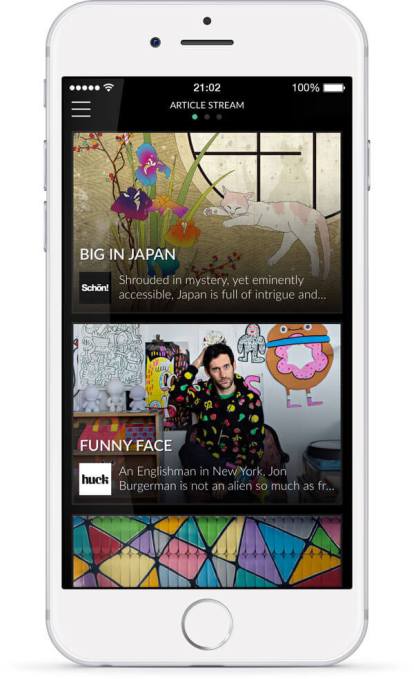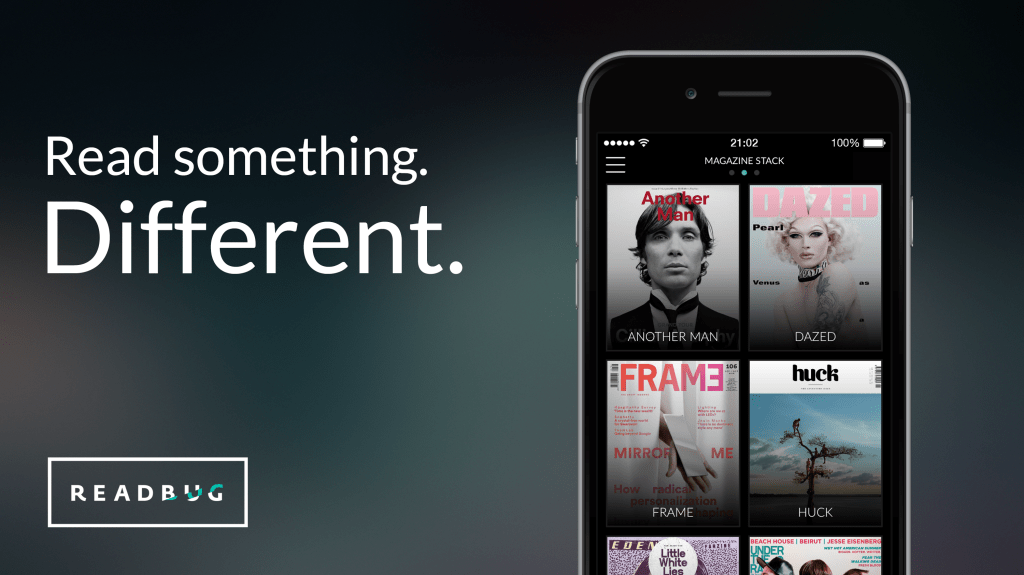Anyone who’s worked for any length of time in the publishing industry will, given the slightest amount of alcohol, wax lyrical about broken business models and the clickbaity-hell being wreaked on editorial content.
So it’s no surprise how often you find publishing industry types turning entrepreneurial in the hopes of building a better model for journalism and editorial content. E.g. Blendle and Blockfeed, to name two recent startups that spring to mind. (A third, Clippet, was co-founded by media mogul Rupert Murdoch’s grandson.)
London based Readbug is another startup with publishing industry expertise firing its engines. Co-founder and CEO Matthew Hammett has a background launching small and big magazine titles. And his startup pitch can be summed up very concisely — as ‘Spotify for magazines’.
Specifically independent, cult and classic magazine titles — so not the garish mass market fare you’ll find rammed in your eyeline at the supermarket checkout screaming about celebrities and cellulite. Readbug bills its aggregated digitized magazine content as alternative/aspirational stuff, read by “creative and curious” types. And Hammett says it’s deliberately “handpicking and curating” the titles it wants to repackage and distribute on its platform in order to establish its own editorial voice — as well it must to stand a chance of pulling eyeballs in an era of free info overload.
The app offers an all-you-can-eat content model across its selected magazine titles for a monthly subscription fee (currently costing £9.99 in the U.K.). Users can browse and read specific titles, as well as telling the app general interests to get relevant content pushed to them. There’s no freemium element as yet (aside from an initial seven day free trial) but the plan is to add some free channels in future, showcasing a selection of content curated by Readmag staff, as a way to expand the app’s appeal down the line. 
Reader revenue is divided between Readbug and its publishing partners, with a 30:70 share. The publishers’ pot of money is divided between all the title owners, based on the content Readbug’s users have been reading each month. So it’s a pretty simple model — albeit an all-you-can-eat Spotify one, vs (for instance) rival journalism marketplace Blendle’s pay-per-article iTunes style offering.
Readbug’s pitch to its target indie publishers is the chance to increase their digital reach without having to do any extra work or spend any extra money themselves. They might even get to grow their dead-tree subscribers, given the team intends to add a buy button to the platform to make it easier for new media readers to become old media consumers too.
“My background’s publishing. I’ve come from some big publishing houses and it was as simple as just thinking there’s got to be a better model, and ‘Spotify for magazines’. There’s got to be a better distribution model for digital content, for a digital magazine,” Hammett tells TechCrunch, explaining the germ of Readbug’s idea. “And it’s really grown from there.”
“Part of the conversation [with publishers] is look, we’re not trying to replace print, we’re trying to open it up to a digital market,” he adds. “We convert all our content so it’s mobile friendly… We’re adding a buy-it-now function so the reader can — at the end of an article or a magazine — decide to purchase the magazine there and then.
“So from the publishers’ perspective it’s great… if they want to expand their print distribution to say South America there’s huge cost involved, but we can always market and dip test those areas for them.”
The team started off with a basic business pitch on equity crowdfunding site Seedrs, back in May last year, where they managed to raise £75,000 in around four days — more than the initial £50,000 they had been hoping for. They followed that up with another Seedrs round, pulling in £200,000 last November to get an initial product to market — going on to launch a beta version of their iOS app this February, with nine publishers on board.
They’re now crowdfunding to raise £500,000, again via Seedrs — taking in a small investment from London digital app studio ustwo as part of this round. This third tranche of financing will be focused on ramping up marketing to get more users, as well as continuing building out the number of publishers signed up, says Hammett.
The app currently offers 50 titles — including the likes of Dazed, Huck and Makeshift — with a further 10 ready to be added shortly. He says they’re aiming to have expanded to 125 titles by this time next year.
In terms of users, at this nascent stage, they’ve had around 9,000 downloads so far, and 3,000 registered users — again without doing any significant marketing. Who are the early users? They’re what Hammett describes as “trendsetters or tastemakers”. “They’re East London hipsters. Definitely people who work in creative sectors or ideas based industries,” he says.
On the publishing side, it’s been a tale of two very different mindsets: big vs small. Early discussions with big publishers about aggregating their content on the platform stalled owing to the terms being demanded, says Hammett — pushing Readbug to pivot to focus on the smaller indie mag segment.
“We had a lot of conversations and deals ready to go with some of the bigger publishing houses and the thing is with those guys they’re the big hulking beasts who are very difficult to move and innovate. So they were asking for huge minimum revenue guarantees and all these sort of things. In the end we were like ‘look guys, how much we’ve raised is in the public domain. We’re a small startup, a few people with big ideas — we can’t really lock into these sort of guarantees’,” he says.
“Something that really sprung out for us was that at the same time, we had about nine or so publishers who were kind of like independent publishers — so independent magazines — and these guys were completely different. It was a completely different conversation. They were like ‘yeah let’s push it globally, let’s do everything we can to get behind you, we’re really excited about it’. And so at the same time as shelving these more mainstream deals we really saw a group of publishers who were really behind us.”
Readbug digitizes the content it get from its publishing partners so they don’t have to — again, making the model a good fit for smaller indies who likely don’t have the resources to dabble around with tech themselves (vs big publishers who may well already have their own apps).
“Everything we do is to support the publishers so when we convert it to a digital format we use the publishers’ fonts, we use their color schemes, and try and inject some of that character back in to it as well,” says Hammett . “The analogy is the vinyl collector at home with his record collection but when he sets out the door sticks Spotify or sticks their playlist on… There’s a balance between the two.
“Ultimately it’s about broadening their reach. For a magazine to print 20,000 issues — that’s the limit of their reach, whereas for us we can take your labor of love, this beautifully crafted journalism, and we can push it out to a global, digital audience. There is a real appeal to them there.”
As well as faithfully reproducing entire indie magazines, cover to cover, in a mobile-friendly digital format, including any ads that were in the original magazines (albeit only as a scanned image, not a digital ad unit at this stage), the team also augments the content with any additional digital material a magazine might have produced for its own website, say. By, for example, embedding related video or audio content into relevant articles.
The device you’ve got closest to hand — your phone, basically — is what we’re interested in.
In future, Hammett says they want to work more closely with publishers on further enhancing the digital versions of their magazines that are being distributed on its platform. “We’re looking at things like in-house content… original content. Where we add in video content from publishers currently, to sort of say to these guys look, if you’re got photo shoots let us chip in on it as well and perhaps make it a video as well — stuff like that. Really try and support and enhance what publishers are doing.”
Interestingly, Hammett notes that the vast majority of current Readbug users (circa 95 per cent) are reading the digital magazine content on their phones, not their iPads (although the app is available for both device types). So the use-case is presumably more about filling in dead time during coffee breaks and commutes, rather than getting people to curl up in bed or on the sofa with their iPad for a long reading session — as you might expect them to do with an actual, paper magazine.
“It’s the device you’ve got closest to hand — your phone, basically — is what we’re interested in,” he notes, adding: “Readbug is available on iPad but it’s definitely not as interesting to us.”
The £9.99 per month fee seems a little steep for a magazine-based digital media offering which requires users apply their full attention in order to consume the content (vs music which can just be background noise) — especially when you consider moves by mobile device makers to freely repackage editorial content as another perk they push out, such as Apple News on iOS, or Samsung’s editorial alliance with Axel Springer.
That said, indie mag content does not come cheap — with Hammett noting that its target magazine titles are typically priced between £5 and £15 on the shelf. So the price-point is probably appropriately expensive enough for the style conscious buyers Readbug is targeting. He says the team hopes to have some 45,000 subscribers signed up by this time next year — quantifying how many hipsters he reckons will shell out for on tap mobile access to their reading matter of choice.































Comment